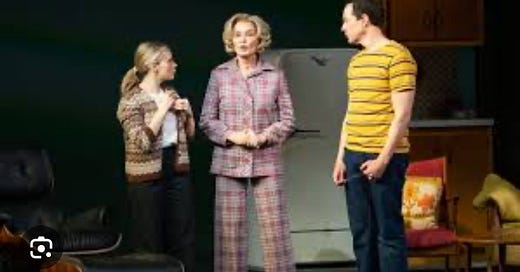You can choose your friends but you can’t choose your family. And even if you could, it’s unlikely you’d pick someone like Phyllis (Jessica Lange) as your mother.
As Paula Vogel’s semi-autobiographical “Mother Play” (Second Stage) opens, we learn that Phyllis has been abandoned by her philandering husband and is living, in suburban DC circa 1964, with her two kids. When she isn’t drinking herself into a stupor, she nags her son and daughter about every conceivable subject, from the way they dress to the music they listen to. She also reminisces about her own pre-marriage life in wartime DC. What comes across rather strongly is that Phyllis never really wanted to be a mother in the first place.
However, she does support the family by taking low-level government jobs, which unfortunately gets them little more than a series of roach-infested apartments. (Brief aside: in a few amusing sequences orchestrated by director Tina Landau, the roaches stage a revolution of their own, and puppets appear and dance along the ramparts of the set to the tune of “La Cucaracha.”)
Whenever Phyllis complains to her super about the vermin infestation, the family is evicted from the apartment. Note: the subtitle of the play is “A play in five evictions” and the timespan is roughly six decades.
Her young son Carl (an exceedingly hammy Jim Parsons) flits about the room, quoting Lytton Strachey and adopting the mode of a worldly aesthete. He encourages his sister Martha (Celia Keenan-Bolger) to read “The Well of Loneliness,” a lesbian classic. Phyllis is sure her son will be a great novelist someday but tells Martha the best she can hope for is a typist position.
As the play moves into the late 1960s and the 1970s, Phyllis’ drinking becomes more problematic. Carl feels more comfortable about telling her that he is gay, which Phyllis inexplicably doesn’t see coming. Appalled, she throws him out of the house—and her life. Things continue to spiral downward.
We eventually find Phyllis all alone. And in a heartbreaking, wordless sequence, she putters around an empty apartment, devoid of purpose (e.g., meddling in her children’s lives). It’s a scene that combines humor and pathos, and Lange pulls it off beautifully.
At times, “Mother Play” feels like a B-plus version of “The Glass Menagerie.” But if anybody can raise the level of the play to A-minus, it’s Jessica Lange. She captures every nuance of Phyllis’ life—from nerve-wracked young working mother, to homophobic middle-aged Southern mama, to dementia-ridden nursing-home patient.
Equal to Lange in the acting department is Keenan-Bolger (“The Gilded Age”) who serves as the unofficial narrator of the play. She is the Vogel stand-in, looking back from approximately the present. Her haunting scene with Phyllis in the nursing home will resonate strongly with those who’ve faced similar situations with elderly parents.
“Mother Play” is so raw at times, it’s bound to make us wonder if the way our parents raised us unintentionally did more harm than good. But such projection is futile. This story, like those in her other plays, is Paula Vogel’s alone and it is a solid and worthwhile one indeed.
Like this review? Follow me at “What Does Aug Think?” at acsntn.substack.com. Thank you!




Jessica will get the Tony.
Yes, 1000 times. Thanks Auggie.